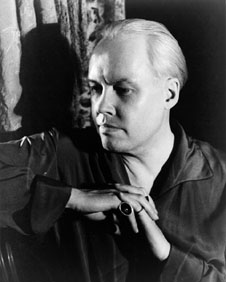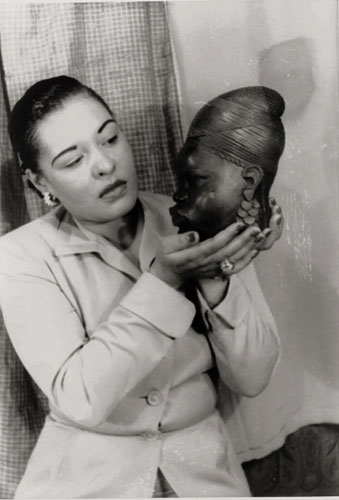Notice that the performers are entirely black and the audience is entirely white. This was the norm back at this time.
Tuesday, April 20, 2010
Thursday, April 8, 2010
NPR piece about Passing, presented by Heidi Durrow
Hi folks,
Yesterday on National Public Radio, Heidi Durrow, one of the Mixed Chicks we watched on YouTube and author of The Girl Who Fell from The Sky, presented an essay on Nella Larsen's Passing. Extra credit (5 HW points) for anyone who reads or listens to her essay and writes a short reflection (50 words or so) on what, for Durrow, is the most important message in Passing.
Here's the link: http://www.npr.org/templates/story/story.php?storyId=125574331
Heidi Durrow (whose mother was Danish...Nella Larsen also has a familial connection to Denmark, which she writes about in her semi-autobiographical novel, Quicksand)
Yesterday on National Public Radio, Heidi Durrow, one of the Mixed Chicks we watched on YouTube and author of The Girl Who Fell from The Sky, presented an essay on Nella Larsen's Passing. Extra credit (5 HW points) for anyone who reads or listens to her essay and writes a short reflection (50 words or so) on what, for Durrow, is the most important message in Passing.
Here's the link: http://www.npr.org/templates/story/story.php?storyId=125574331
Heidi Durrow (whose mother was Danish...Nella Larsen also has a familial connection to Denmark, which she writes about in her semi-autobiographical novel, Quicksand)
Wednesday, April 7, 2010
Friday, April 2, 2010
Carl Van Vechten, "Slumming", and the Negro Primitive
Carl Van Vechten (1880-1964)—writer, photographer, and patron of the arts—helped promote many of the major figures of the Harlem Renaissance, including Langston Hughes and Nella Larsen, who dedicated her novella Passing to Van Vechten. In Passing we are introduced to Hugh Wentworth, who is a character based on Van Vechten. Hugh Wentworth is one of many sophisticated New York socialites who go up to Harlem for mixed social gatherings and the black jazz venues. In fact, Van Vechten’s novel Nigger Heaven (the name was very controversial upon publication) has been attributed with sparking a great deal of white interest in the nightlife of Harlem, which led many white New Yorkers to Harlem for some “slumming” fun. The term “slumming” refers to acts in which more upper class people associate with lower class people often as a source of illicit enjoyment, the sort of stolen enjoyment people would get from the speakeasies of the same time period (Prohibition).
What ultimately drew many “slummers” to associate with the blacks of Harlem was a positive spin on some long-time racist notions about “blackness”: Blacks were less civilized; therefore, they were less repressed than whites, which meant they have more fun! Blacks were less restricted by the morality and values of late Victorian society; well, that meant they were more honest and expressive artists, truer to their primal nature, and, therefore, more authentic, more “real,” than most white artists. Blacks were less sexually inhibited than whites; therefore, many whites saw blacks as a source of sexual freedom that had been denied them through the demands of “civilized” society. In a weird positive spin on the idea of “ontogeny recapitulates phylogeny,” which we discussed when studying Postcolonial criticism, just as modern, civilized individuals looked back with longing to the simpler, more pleasure-filled days of their childhood, many whites saw blacks as living a simpler, more pleasure-filled life by dint of their child-like status in the evolution of mankind, and many of these whites desired to associate with blacks as a means of recapturing the lost pleasures of the earlier stages of human development. This is the ideology of primitivism, which is essentially the other side of the coin from the racist colonial ideology, which believed Africans needed the governing, paternalistic hand of civilized Europeans to "grow up", and the other side of the coin from American racist ideology that saw the “uncivilized” and “overly sexual” character of blacks as threatening to white society, particularly the purity of white womanhood. Many lynchings in the South, during the late 19th and early 20th centuries, were inspired by charges, frequently false, of a sexual assault by a black man upon a white woman. Think of To Kill a Mockingbird.
What ultimately drew many “slummers” to associate with the blacks of Harlem was a positive spin on some long-time racist notions about “blackness”: Blacks were less civilized; therefore, they were less repressed than whites, which meant they have more fun! Blacks were less restricted by the morality and values of late Victorian society; well, that meant they were more honest and expressive artists, truer to their primal nature, and, therefore, more authentic, more “real,” than most white artists. Blacks were less sexually inhibited than whites; therefore, many whites saw blacks as a source of sexual freedom that had been denied them through the demands of “civilized” society. In a weird positive spin on the idea of “ontogeny recapitulates phylogeny,” which we discussed when studying Postcolonial criticism, just as modern, civilized individuals looked back with longing to the simpler, more pleasure-filled days of their childhood, many whites saw blacks as living a simpler, more pleasure-filled life by dint of their child-like status in the evolution of mankind, and many of these whites desired to associate with blacks as a means of recapturing the lost pleasures of the earlier stages of human development. This is the ideology of primitivism, which is essentially the other side of the coin from the racist colonial ideology, which believed Africans needed the governing, paternalistic hand of civilized Europeans to "grow up", and the other side of the coin from American racist ideology that saw the “uncivilized” and “overly sexual” character of blacks as threatening to white society, particularly the purity of white womanhood. Many lynchings in the South, during the late 19th and early 20th centuries, were inspired by charges, frequently false, of a sexual assault by a black man upon a white woman. Think of To Kill a Mockingbird.
The brand of primitivist ideology that fixates on blacks and black culture was called Negrophilia, a word that became widely used during the 1920s and 1930s. The French coined the term, for on the other side of the Atlantic, French culture was caught up in their own fascination with blackness as a symbol of primitive pleasure. The African-American performer Josephine Baker became wildly popular in France by dancing and performing in tribal garb. Left in a photo taken by Carl Van Vechten of Billie Holiday (with an African sculpture), and below is a YouTube video of Josephine Baker doing her "Danse Sauvage" (dance of the savage) for a French audience. She was hugely popular, but she played up to French fantasies of what being black meant--having more fun, being uninhibited, more sexually free, etc.
Subscribe to:
Posts (Atom)





